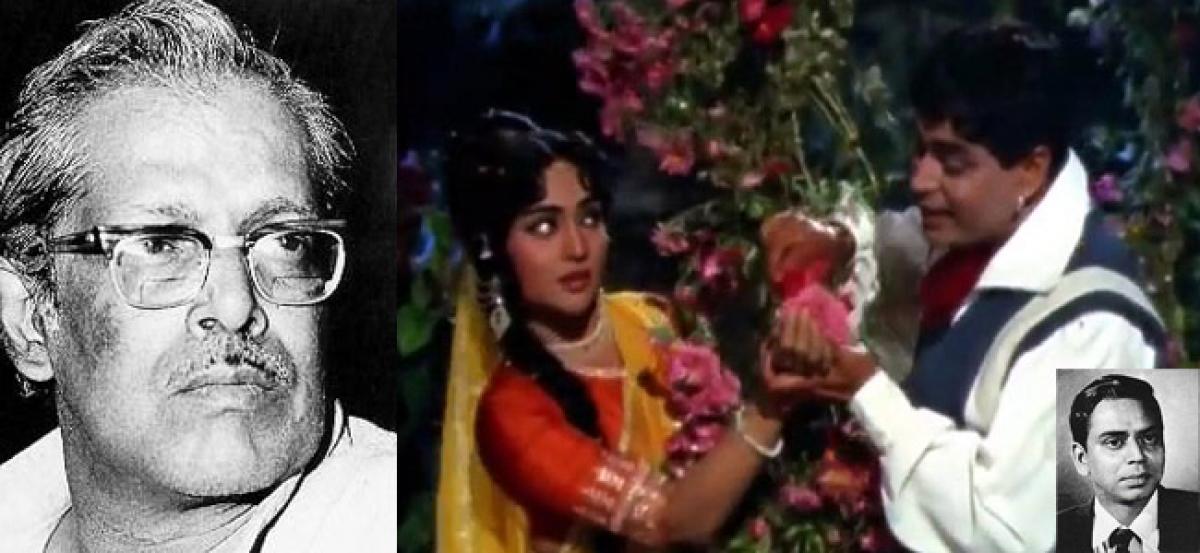Live
- Bhumana Abhinay hoists YSRCP flag at Everest base camp
- VHP resolves to oppose Waqf Board’s land claims
- Youth dies by suicide on moving APSRTC bus
- Don’t harass students for fees: Collector
- K’taka HC dismisses interim application of Subbareddy
- Will keep our promise of developing Channapatna: DCM
- Don’t collect excess fee from students
- Double registration leads to enmity between two parties
- JD(S) first family avoids discussion on bypoll debacle
- Hari Chandana’s Green Initiatives: Transforming Hyderabad for a better Future
Just In

When the BBC Radio Asian Network ran a poll to list the 100 greatest Bollywood songs of all time, the title song from the 1951 release ‘Awaara’ bagged the second place, behind the classic Rafi number “Baharon Phool Barsao” from the Rajendra Kumar-Vyjayantimala - starrer ‘Suraj’ (1966).
When the BBC Radio Asian Network ran a poll to list the 100 greatest Bollywood songs of all time, the title song from the 1951 release ‘Awaara’ bagged the second place, behind the classic Rafi number “Baharon Phool Barsao” from the Rajendra Kumar-Vyjayantimala - starrer ‘Suraj’ (1966).
The lyricist of the Raj Kapoor-Nargis - starrer was none other than Shankardas Kesarilal (1923-1966), popularly known as Shailendra, who was born on August 30. Interestingly, he had written the lyrics for ‘Suraj’ too, but the particularsong, which got the top prize was written by Hasrat Jaipuri! The big achievement that Shailendra enjoyed however was the global reach of his song all across Eastern Bloc countries, especially Russia and China, where it was touted to be one of the favourites of its premier, Chairman Mao! So much so, this Urdu number had translations effected into Russian, Chinese and English languages also and heard even today.
Beginning in 1947 as a song writer in Mumbai, the Rawalpindi-born Bihari-origin legend rose quickly on the popularity charts. Other than the rock-solid support of Raj Kapoor, his radical lines went well with the socialist bent of mind that the directors like Bimal Roy possessed. He was chummy with Dev Anand too for whose films ‘Guide’ and ‘Kala Bazaar’, he penned timeless lines. While Shankar-Jaikishan were his booster shot, his association with the other big names like SD Burman, Salil Chowdhary and Ravi meant a steady line of hits all around. His end was tragic as he died a broken man, as an alcoholic unable to come to terms with the failure of his magnum opus ‘Teesri Kasam’ into which he invested heavily and lost.
The darling of middle-class cinema watchers, Hrishikesh Mukherjee (1922-2006), who died 11 years ago on August 27 re-defined the parameters of commercial cinema, in which sensible storytelling was blended with music and emotions. He directed 42 films, in a career of four decades and held important positions as the head of the Censor Board and the National Film Development Corporation.
He was also the recipient of the Dada Saheb Phalke Award. This director had a long innings, which stretched well into the late ‘80s where he continued churning hits like ‘Khoobsurat’, ‘Golmaal’, etc. For watchers of contemporary Hindi cinema, however, the two films he directed ‘Anand’ (1971) and ‘Namak Haraam’ (1973) are the yardsticks for measuring the rise and fall of its two superstars – the first ever one named Rajesh Khanna and the next, Amitabh Bachchan, who was to be later hailed as the one-man industry.
Till date, there are juicy tales about how Mukherjee managed the two temperamental heroes and came up with memorable performances in both the hit films. Interestingly, while Mukesh’s songs were a rage in Anand, who died this month August 27, 41 years ago, the second film ‘Namak Haraam’ had a series of Kishore Kumar hits the maverick actor, singer who was born in the same month, 89 years ago!
K Naresh Kumar

© 2024 Hyderabad Media House Limited/The Hans India. All rights reserved. Powered by hocalwire.com







